| Listing 1 - 10 of 82 | << page >> |
Sort by
|
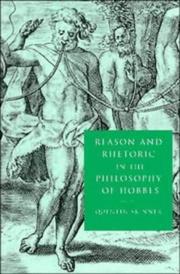
ISBN: 0521596459 0521554365 0511598572 9780521554367 Year: 1996 Publisher: Cambridge : Cambridge University Press,
Abstract | Keywords | Export | Availability | Bookmark
 Loading...
Loading...Choose an application
- Reference Manager
- EndNote
- RefWorks (Direct export to RefWorks)
Quentin Skinner presents a fundamental reappraisal of the political theory of Hobbes. Using, for the first time, the full range of manuscript as well as printed sources, it documents an entirely new view of Hobbes's intellectual development, and re-examines the shift from a humanist to a scientific culture in European moral and political thought. By examining Hobbes's philosophy against the background of his humanist education, Professor Skinner rescues this most difficult and challenging of political philosophers from the intellectual isolation in which he is so often discussed. This book presents a splendid exemplification of the 'Cambridge' contextual approach to the study of intellectual history with which Professor Skinner himself is especially associated. It will be of interest and importance to a wide range of scholars in history, philosophy, politics, and literary theory. Professor Skinner has been awarded the Balzan Prize Life Time Achievement Award for Political Thought, History and Theory. Full details of this award can be found at http://www.balzan.it/News_eng.aspx?ID=2474.
History of philosophy --- Hobbes, Thomas --- Mind --- Raison --- Rationaliteit --- Rationality --- Rationalité --- Reason --- Rede --- Retorica --- Rhetoric --- Rhétorique --- Reason. --- Political science --- Science politique --- History --- Political aspects --- Histoire --- Aspect politique --- Hobbes, Thomas, --- Rhetoric. --- Language and languages --- Speaking --- Authorship --- Expression --- Style, Literary --- Intellect --- Rationalism --- Rhétorique --- Literary style --- Hobbes, Thomas, - 1588-1679. --- Gobbs, Tomas, --- Hobbs, Thomas, --- Gobbes, Tomas, --- T. H. --- H., T. --- Hobs, Thomas, --- Hobbes, --- Hobbes, Thom. --- Hobbius, Thomas, --- Hobbuzu, Tomasu, --- Huobusi, --- Hobbs, Tho. --- הובס, תומס, --- 霍布斯, --- ホッブズ, トマス, --- Social Sciences --- Political Science
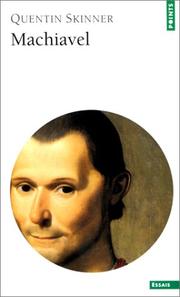
ISBN: 202048191X 9782020481915 Year: 2001 Volume: 451 Publisher: Paris : Seuil,
Abstract | Keywords | Export | Availability | Bookmark
 Loading...
Loading...Choose an application
- Reference Manager
- EndNote
- RefWorks (Direct export to RefWorks)
Machiavelli, Niccolò, --- Politologues --- Machiavelli, Niccolò, --- Politologues - Italie - Biographies
Book
ISBN: 9788822264602 8822264606 Year: 2016 Publisher: Firenze : Olschki,
Abstract | Keywords | Export | Availability | Bookmark
 Loading...
Loading...Choose an application
- Reference Manager
- EndNote
- RefWorks (Direct export to RefWorks)
History of civilization --- Philosophy --- Liberty --- Liberté --- History. --- Histoire --- Liberté --- freedom
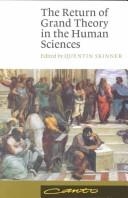
ISBN: 0521318084 9780521318082 Year: 1985 Publisher: Cambridge Cambridge University press
Abstract | Keywords | Export | Availability | Bookmark
 Loading...
Loading...Choose an application
- Reference Manager
- EndNote
- RefWorks (Direct export to RefWorks)
Social sciences --- Social history --- Social scientists. --- Philosophy. --- Social scientists --- 316.2 --- 316.2 Sociologische richtingen. Sociologische scholen. Sociologen --- Sociologische richtingen. Sociologische scholen. Sociologen --- Scientists --- Policy scientists --- Social philosophy --- Social theory --- Philosophy --- Sociological theory building --- Philosophy of science --- Social sciences - Philosophy. --- Social history - 20th century.
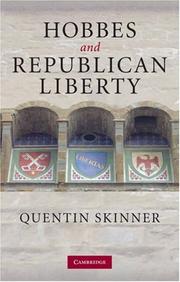
ISBN: 9780521714167 9780521886765 0521886767 Year: 2008 Publisher: Cambridge Cambridge university press
Abstract | Keywords | Export | Availability | Bookmark
 Loading...
Loading...Choose an application
- Reference Manager
- EndNote
- RefWorks (Direct export to RefWorks)
Republicanism --- Liberty --- Political science --- Philosophy --- Hobbes, Thomas, --- Political philosophy. Social philosophy --- Hobbes, Thomas --- Gobbs, Tomas, --- Hobbs, Thomas, --- Gobbes, Tomas, --- T. H. --- H., T. --- Hobs, Thomas, --- Hobbes, --- Hobbes, Thom. --- Hobbius, Thomas, --- Hobbuzu, Tomasu, --- Huobusi, --- Hobbs, Tho. --- הובס, תומס, --- 霍布斯, --- ホッブズ, トマス, --- Liberty - Philosophy --- Hobbes, Thomas, - 1588-1679
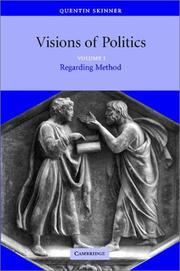
ISBN: 9780521581059 9780521589260 9780511790812 0521589258 9780521589253 0521890601 9780521581066 9780511613777 0511039808 9780511039805 9780511148156 0511148151 1280418648 9786610418640 0511613776 0511177747 051132264X 0511053908 1107127319 9780521890601 0521589266 0521589266 0521890608 0521581060 Year: 2002 Publisher: Cambridge : Cambridge University Press,
Abstract | Keywords | Export | Availability | Bookmark
 Loading...
Loading...Choose an application
- Reference Manager
- EndNote
- RefWorks (Direct export to RefWorks)
The second of three volumes of essays by Quentin Skinner, one of the world's leading intellectual historians. This collection includes some of his most important essays on the political thought of the Italian renaissance, each of which has been carefully revised for publication in this form. All of Professor Skinner's work is characterised by philosophical power, limpid clarity, and elegance of exposition; these essays, many of which are now recognised classics, provide a fascinating and convenient digest of the development of his thought. Professor Skinner has been awarded the Balzan Prize Life Time Achievement Award for Political Thought, History and Theory. Full details of this award can be found at http://www.balzan.it/News_eng.aspx?ID=2474
Political philosophy. Social philosophy --- Political science --- Philosophy --- Hobbes, Thomas --- 321.01 --- 321.01 Algemene staatsleer. Politieke filosofie. Staatsleer. Staatstheorie --- Algemene staatsleer. Politieke filosofie. Staatsleer. Staatstheorie --- Political philosophy --- Philosophy. --- Political science. --- Administration --- Civil government --- Commonwealth, The --- Government --- Political theory --- Political thought --- Politics --- Science, Political --- Social sciences --- State, The --- Political science - Philosophy --- Hobbes, Thomas, - 1588-1679 --- 321.01 HOBBES, THOMAS --- 321.01 HOBBES, THOMAS Algemene staatsleer. Politieke filosofie. Staatsleer. Staatstheorie--HOBBES, THOMAS --- Algemene staatsleer. Politieke filosofie. Staatsleer. Staatstheorie--HOBBES, THOMAS --- Gobbs, Tomas, --- Hobbs, Thomas, --- Gobbes, Tomas, --- T. H. --- H., T. --- Hobs, Thomas, --- Hobbes, --- Hobbes, Thom. --- Hobbius, Thomas, --- Hobbuzu, Tomasu, --- Huobusi, --- Hobbs, Tho. --- הובס, תומס, --- 霍布斯, --- ホッブズ, トマス, --- Science politique --- Philosophie politique --- Hobbes, Thomas (1588-1679) --- Méthodologie --- Histoire --- Renaissance --- Critique et interprétation --- Social Sciences --- Political Science
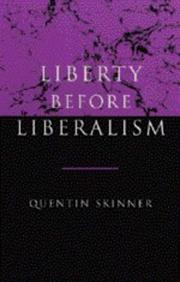
ISBN: 0521638763 0521632064 1139171275 9780521638760 9781139171274 Year: 1998 Publisher: Cambridge : Cambridge University Press,
Abstract | Keywords | Export | Availability | Bookmark
 Loading...
Loading...Choose an application
- Reference Manager
- EndNote
- RefWorks (Direct export to RefWorks)
This extended essay by one of the world's leading historians seeks, in its first part, to excavate, and to vindicate, the neo-Roman theory of free citizens and free states as it developed in early-modern Britain. This analysis leads on to a powerful defence of the nature, purposes and goals of intellectual history and the history of ideas. As Quentin Skinner says, 'the intellectual historian can help us to appreciate how far the values embodied in our present way of life, and our present ways of thinking about those values, reflect a series of choices made at different times between different possible worlds'. This essay thus provides one of the most substantial statements yet made about the importance, relevance and potential excitement of this form of historical enquiry. Liberty before Liberalism is based on Quentin Skinner's Inaugural Lecture as Regius Professor of Modern History in the University of Cambridge, delivered in November 1997. Professor Skinner has been awarded the Balzan Prize Life Time Achievement Award for Political Thought, History and Theory. Full details of this award can be found at http://www.balzan.it/News_eng.aspx?ID=2474
Political philosophy. Social philosophy --- History of philosophy --- anno 1500-1799 --- Liberalism --- Liberty --- Civil liberty --- Emancipation --- Freedom --- Liberation --- Personal liberty --- Democracy --- Natural law --- Political science --- Equality --- Libertarianism --- Social control --- Liberal egalitarianism --- Social sciences --- Liberalism. --- Liberty. --- Libéralisme --- Liberté --- Arts and Humanities --- History
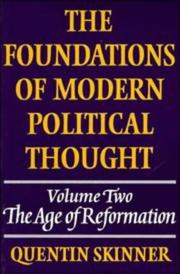
ISBN: 0521220238 0521294355 0521222842 9780521220231 1139929860 1139927027 0511817894 0521293375 1139085123 1107384559 0511817878 9780521293372 9780521294355 9780521222846 9780511817878 Year: 1978 Publisher: Cambridge : Cambridge University Press,
Abstract | Keywords | Export | Availability | Bookmark
 Loading...
Loading...Choose an application
- Reference Manager
- EndNote
- RefWorks (Direct export to RefWorks)
A two-volume study of political thought from the late thirteenth to the end of the sixteenth century, the decisive period of transition from medieval to modern political theory. The work is intended to be both an introduction to the period for students, and a presentation and justification of a particular approach to the interpretation of historical texts. Quentin Skinner gives an outline account of all the principal texts of the period, discussing in turn the chief political writings of Dante, Marsiglio, Bartolus, Machiavelli, Erasmus and more, Luther and Calvin, Bodin and the Calvinist revolutionaries. But he also examines a very large number of lesser writers in order to explain the general social and intellectual context in which these leading theorists worked. He thus presents the history not as a procession of 'classic texts' but are more readily intelligible. He traces by this means the gradual emergence of the vocabulary of modern political thought, and in particular the crucial concept of the State. We are given an insight into the actual processes of the formation of ideologies and into some of the linkages between political theory and practice. Professor Skinner has been awarded the Balzan Prize Life Time Achievement Award for Political Thought, History and Theory. Full details of this award can be found at http://www.balzan.it/News_eng.aspx?ID=2474
Political philosophy. Social philosophy --- anno 1200-1499 --- anno 1500-1599 --- Political science --- -Administration --- Civil government --- Commonwealth, The --- Government --- Political theory --- Political thought --- Politics --- Science, Political --- Social sciences --- State, The --- History --- -History --- -Social sciences --- Administration --- Arts and Humanities --- Political science - History --- History. --- Philosophy --- Theories. --- History of theories --- Theories
Book
ISBN: 0192875167 0192875175 Year: 1996 Publisher: Oxford Oxford university press
Abstract | Keywords | Export | Availability | Bookmark
 Loading...
Loading...Choose an application
- Reference Manager
- EndNote
- RefWorks (Direct export to RefWorks)
Political scientists --- Policy scientists --- Machiavelli, Niccolò, --- Machiavelli, Niccolò --- マキアヴェルリ
Multi
ISBN: 9781107128859 9781316415559 9781107569362 Year: 2018 Publisher: Cambridge Cambridge University Press
Abstract | Keywords | Export | Availability | Bookmark
 Loading...
Loading...Choose an application
- Reference Manager
- EndNote
- RefWorks (Direct export to RefWorks)
The aim of this collection is to illustrate the pervasive influence of humanist rhetoric on early-modern literature and philosophy. The first half of the book focuses on the classical rules of judicial rhetoric. One chapter considers the place of these rules in Shakespeare's The Merchant of Venice, while two others concentrate on the technique of rhetorical redescription, pointing to its use in Machiavelli's The Prince as well as in several of Shakespeare's plays, notably Coriolanus. The second half of the book examines the humanist background to the philosophy of Thomas Hobbes. A major new essay discusses his typically humanist preoccupation with the visual presentation of his political ideas, while other chapters explore the rhetorical sources of his theory of persons and personation, thereby offering new insights into his views about citizenship, political representation, rights and obligations and the concept of the state. Review: 'In these beautifully crafted essays Skinner shows how Machiavelli, Shakespeare and Hobbes use the plenitude of rhetorical techniques of the humanist curriculum to craft persuasively the features of their different yet equally famous texts. Moreover, each confronts differently the chaos that ensues when these radically redescriptive techniques enter into the world they strive to characterise. A masterpiece.' James Tully, University of Victoria, British Columbia 'In these brilliant essays, centered on Thomas Hobbes, Quentin Skinner presents political discourse as rhetoric, forensic and theatric. He shows how tactical maneuver established fictions which became analytical realities. A challenge and a step forward for political theorists and historians of early modern England and Europe.' J. G. A. Pocock, The Johns Hopkins University 'Quentin Skinner is one of our greatest living humanists. He understands from within the classical tradition that nourished thinkers from Machiavelli to Hobbes and wields language with the force of a Renaissance rhetorician. In this timely work, he deepens his long-standing engagement with humanism and with Hobbes, expands his range to Shakespeare and Milton and sheds new light on the conceptual genealogies of virtue and liberty, representation and the state. From Humanism to Hobbes will be indispensable for intellectual historians, political theorists and early modernists alike.' David Armitage, Harvard University 'Gathered as From Humanism to Hobbes: Studies in Rhetoric and Politics, these essays by Quentin Skinner add greatly to our understanding of the pedagogical and intellectual context in which Hobbes' extraordinary civil science took shape. Even more, though, they offer a masterclass in the particular method of recovering the history of political thought (often referred to as the 'Cambridge School') that has justly become synonymous with Skinner himself.' Sophia Rosenfeld, Walter H. Annenberg Professor of History, University of Pennsylvania 'This is a sparkling collection of essays, elegantly constructed and written with grace and wit. It effortlessly affirms Quentin Skinner's standing as one of the leading historians and finest prose stylists of the day. Each essay considered singly illuminates and develops themes that have animated his recent work - whether the revival of the studia humanitatis and its effects, the visual representation of political ideas, rival conceptions of liberty and political representation, or the genealogy of the modern state - to sometimes striking and revisionary purpose. Considered as a whole, the collection will surely succeed in its design to persuade readers that the cultural shift 'from humanism to Hobbes' was by no means so long a march as has sometimes been supposed, even as it raises pointed questions about the long-run consequences of that shift for political understanding and for our collective well-being as citizens.' Tim Stanton, University of York `In these beautifully crafted essays Skinner shows how Machiavelli, Shakespeare and Hobbes use the plenitude of rhetorical techniques of the humanist curriculum to craft persuasively the features of their different yet equally famous texts. Moreover, each confronts differently the chaos that ensues when these radically redescriptive techniques enter into the world they strive to characterise. A masterpiece.' James Tully, University of Victoria, British Columbia `In these brilliant essays, centered on Thomas Hobbes, Quentin Skinner presents political discourse as rhetoric, forensic and theatric. He shows how tactical maneuver established fictions which became analytical realities. A challenge and a step forward for political theorists and historians of early modern England and Europe.' J. G. A. Pocock, The Johns Hopkins University `Quentin Skinner is one of our greatest living humanists. He understands from within the classical tradition that nourished thinkers from Machiavelli to Hobbes and wields language with the force of a Renaissance rhetorician. In this timely work, he deepens his long-standing engagement with humanism and with Hobbes, expands his range to Shakespeare and Milton and sheds new light on the conceptual genealogies of virtue and liberty, representation and the state. From Humanism to Hobbes will be indispensable for intellectual historians, political theorists and early modernists alike.' David Armitage, Harvard University 'Gathered as From Humanism to Hobbes: Studies in Rhetoric and Politics, these essays by Quentin Skinner add greatly to our understanding of the pedagogical and intellectual context in which Hobbes' extraordinary civil science took shape. Even more, though, they offer a masterclass in the particular method of recovering the history of political thought (often referred to as the `Cambridge School') that has justly become synonymous with Skinner himself.' Sophia Rosenfeld, Walter H. Annenberg Professor of History, University of Pennsylvania 'This is a sparkling collection of essays, elegantly constructed and written with grace and wit. It effortlessly affirms Quentin Skinner's standing as one of the leading historians and finest prose stylists of the day. Each essay considered singly illuminates and develops themes that have animated his recent work - whether the revival of the studia humanitatis and its effects, the visual representation of political ideas, rival conceptions of liberty and political representation, or the genealogy of the modern state - to sometimes striking and revisionary purpose. Considered as a whole, the collection will surely succeed in its design to persuade readers that the cultural shift `from humanism to Hobbes' was by no means so long a march as has sometimes been supposed, even as it raises pointed questions about the long-run consequences of that shift for political understanding and for our collective well-being as citizens.' Tim Stanton, University of York
English literature --- Comparative literature --- Literary rhetorics --- Italian literature --- Hobbes, Thomas --- Rhetoric --- Humanism in literature --- Political science --- Politics in literature --- Political aspects --- Philosophy --- Hobbes, Thomas, --- Shakespeare, William, --- Machiavelli, Niccolò,
| Listing 1 - 10 of 82 | << page >> |
Sort by
|

 Search
Search Feedback
Feedback About
About Help
Help News
News